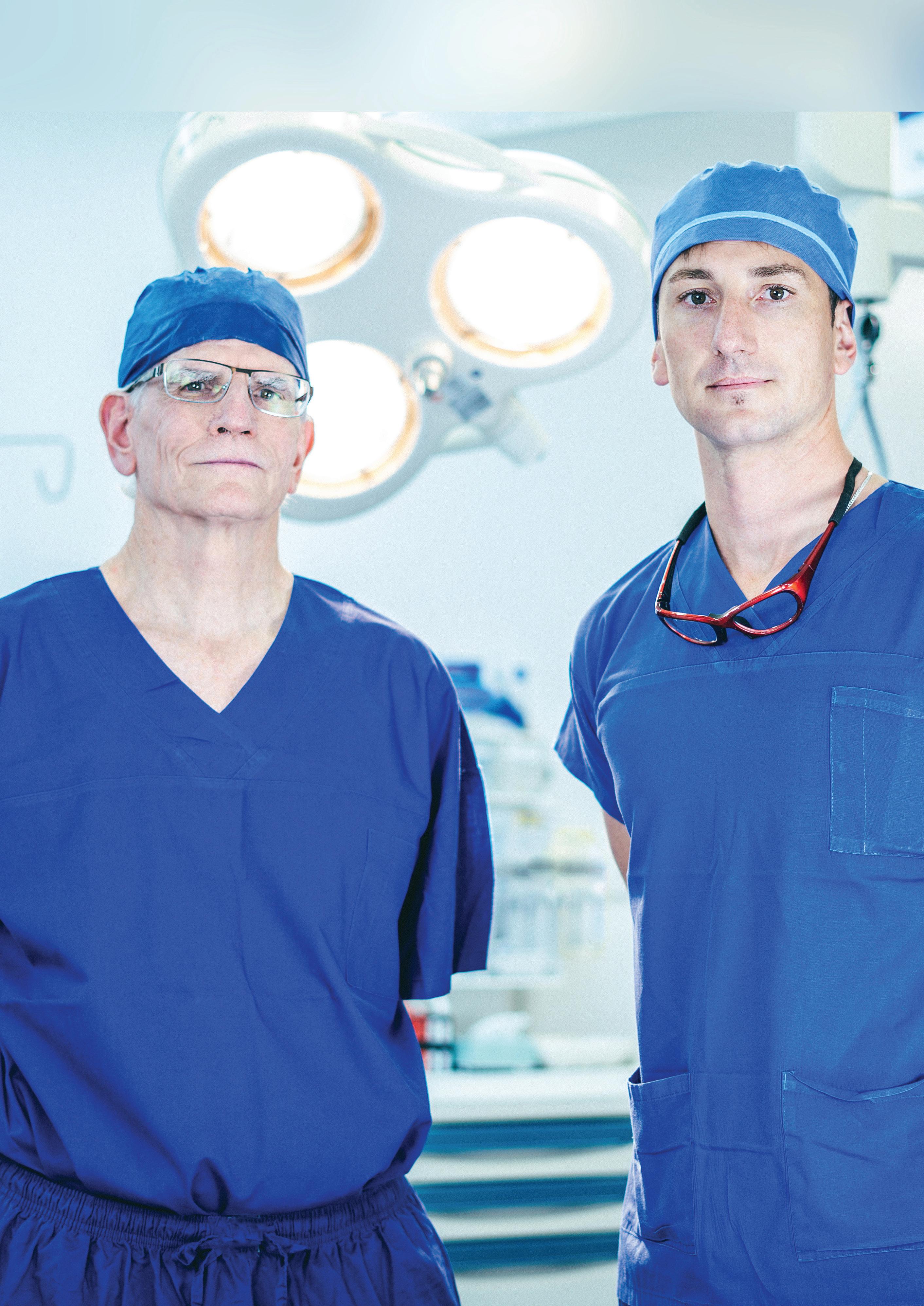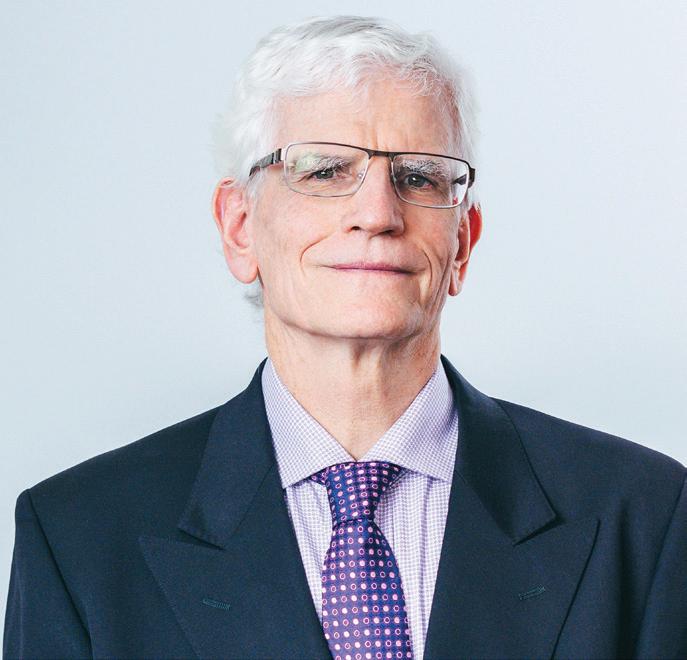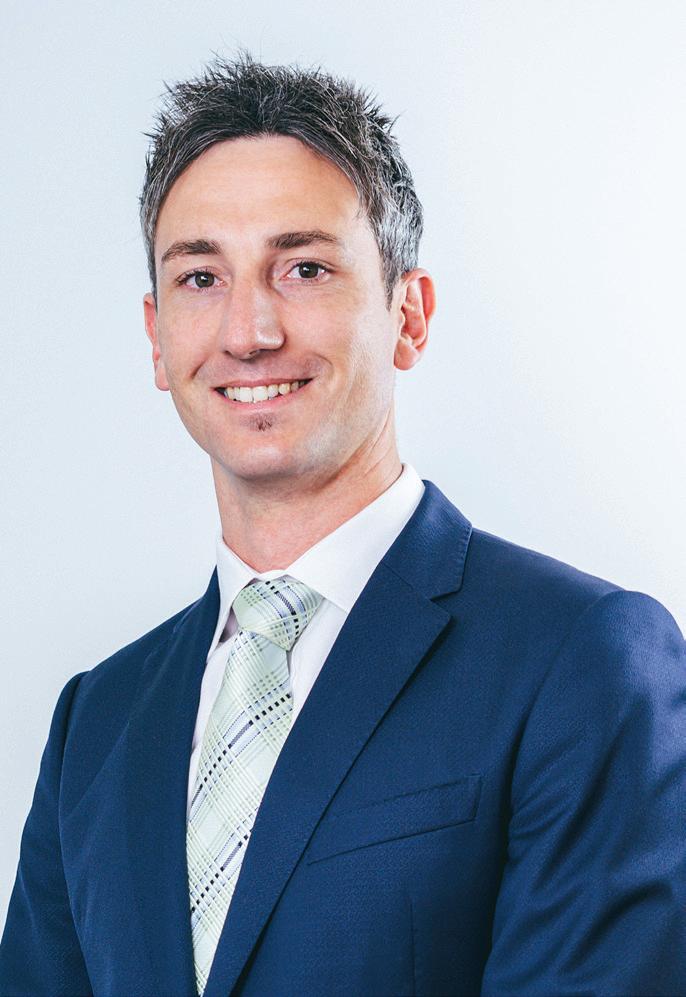
7 minute read
The two of us: Dr Bernie and Dr Victor Bourke
The two of us
Meet father–son vascular surgeons Dr Bernard and Dr Victor Bourke
Advertisement
Dr Bernard Bourke MBBS, FRACS, DDU

In 1986, Dr Bernie Bourke founded Gosford (Central Coast) Vascular services. In so doing, he brought Vascular surgery and diagnostic vascular ultrasound to the Central Coast in New South Wales for the first time. Over the following 10 years, he was the only vascular surgeon on the Central Coast, and built up his surgical practice while attending to many other responsibilities. Personal audit was one of those tasks and, despite the time involved, he maintained a steadfast audit routine. “I think it’s important to monitor your results and have them externally looked at. I did that by publishing papers because there was nobody I could go to audit meetings with,” Dr Bourke said. “I wanted to satisfy myself that I was maintaining standards.” Years later in 2010, together with Dr Barry Beiles, he was instrumental in establishing the Australasian Vascular Audit – which is officially endorsed by the Royal Australasian College of Surgeons (RACS) and a necessary requirement of membership to the Australian & New Zealand Society for Vascular Surgery (ANZSVS). Dr Bourke, who is a past-president of ANZSVS (2016–2018), is also an advocate of ongoing surgical education. He attributes this passion to his time as a medical student under Professor Graham Coupland at Royal North Shore Hospital. “One Sunday morning he made a special point of calling me to help him and his senior colleague, Emeritus Professor Tom Reeve, with a nasty major neck artery laceration sustained by a large sliver of glass in a young girl. He made me feel part of the team even as a medical student,” he said. “That single case demonstrated to me the value of teamwork and humility.” Years later, Dr Bourke became Professor Coupland’s registrar and that same inspirational philosophy contributed to his own love of teaching. He went on to complete a Fellowship in General Surgery, followed by three years at Charing Hospital in London learning Vascular surgery under Professor Roger Greenhalgh. In 2015, Dr Bourke’s son, Dr Victor Bourke, commenced practising at Central Coast Vascular. “There are a number of father and sons in Vascular surgery, but I think we are the only two who work together,” he said. Proud of his son’s achievements, he added, “He’s done it all himself; he’s a great observer.” The two vascular surgeons “occasionally see, treat and operate on selected patients together,” Dr Bourke said. “This is done in an open and transparent way to the patient and anyone else involved in their treatment. We often discuss each other’s patients, which is mutually beneficial, and the patients are very comfortable with it and reassured, it seems.”
Victor picked up the University of New South Wales Foundation Year Graduates Medal for leadership and fellowship in his final year, and did “extremely well” in the RACS Surgical Education Training (SET) for Vascular surgery, Dr Bourke said. “The RACS’ vascular training is recognised worldwide as probably the best in the world,” and “we learn from each
other in practice,” he added. “Like any surgeons, we each have our own specialties within a specialty, and it’s not only the mutual exchange of technical skills, but the development of an approach to management of increasingly complex cases in patients with challenging comorbidities. “Victor and I never really talked about him being a doctor until two weeks before his Higher School Certificate (HSC) when he suddenly announced he’d like to do medicine if he could,” Dr Bourke said. “From school to medical student to surgery and Vascular surgery, we really didn’t discuss things at all until the very last minute when he had, in fact, made up his own mind anyway.” It was “more a case of judicious encouragement”. When his three children were young, Dr Bourke often took them to the hospital on weekends to accompany him on ward rounds. Perhaps this played a part in Victor deciding to study medicine, and his brother, Dr Michael Bourke, completing a PhD and working in medical research and teaching, he suggested. These days, Dr Bourke noted, his fouryear-old granddaughter likes to wear a stethoscope “so it’s conceivable she could become a third-generation vascular surgeon – and I will only be about 96 when she commences surgery, so I should be still operating.”
Dr Victor Bourke MBBS (Hons), BSc Med (Hons), BA (Lit), MS, FRACS
For Dr Victor Bourke, studying medicine was a last-minute decision. He was interested in law, but decided instead to undertake a seven-year combined arts/ medicine program at the University of New South Wales. While growing up, he occasionally would ask his dad, Dr Bernard Bourke, what he did for work. “We would talk about carotid surgery and aneurysms and bypasses,” he said. “It was not uncommon to find a carotid endarterectomy specimen in formalin on the breakfast table, and I would hear the phone ring at odd hours during the night. “I think dad enjoyed seeing me think about a surgical problem for the first time when I was young. He would ask me how I would fix an aneurysm,” Dr Bourke said. “I remember being engaged by trying to visualise what was going on, and come up with a solution. I’ve seen him do the same with his medical students.” Part of Dr Bourke’s combined degree took him to Dublin for six months on an exchange program. There he studied the Irish poets, Shakespeare and 20thcentury American literature. Medicine wasn’t far away, though, and during that time he also worked as a phlebotomist. A pivotal moment for Dr Bourke came at the Prince of Wales Hospital in Sydney. A medical student at the time, he was in theatre with the late Associate Professor Bryan Yeo, who was “looking down a cholangioscope with pure, child-like joy,” he said. “He passed the scope to me and I could see bile stones hurtling toward the lens, like asteroids in orbit. It was amazing.” Associate Professor Yeo, a lover of tennis, also pointed out that “surgery is about moving your feet”, and this lesson has stayed with Dr Bourke “to this day, particularly in open surgery”. As a resident, Dr Bourke assisted surgeons on his days off and in 2011 took a year off his Surgical Education Training (SET) to undertake a Master of Surgery (Vascular) at the University of Sydney. During that time, he assisted vascular surgeons in the private system. Working now with his father at Central Coast Vascular, he describes him as “a very flexible thinker”, who has made introducing new surgical techniques to the Central Coast possible and very rewarding. Over the past five years, the two have introduced new techniques that are supported by evidence and subjected to audit. These have included endovascular thoracic aneurysm repair, intravascular ultrasound, endovascular treatment of mesenteric aneurysmal disease, mechanical thrombolysis, endovascular deep venous reconstruction, treatment of pelvic venous incompetence and rotational atherectomy. “Working together is one of the greatest pleasures I’ve had as a doctor,” Dr Bourke said. “It is atypical, I suppose, but I think there are benefits, to the patients – first and foremost – and professionally. “When we started working together, I was already fully trained as a vascular surgeon,” Dr Bourke said. The registrars around Gosford can get confused by the name “Dr Bourke”, he explained, and “I believe they call us Big Bourke and Little Bourke for the sake of clarity.” The two have developed a hybrid technique for para-renal aneurysm repair using a Teflon collar “that is useful in both open abdominal aneurysm repair and as a hybrid procedure where we use it to make a landing zone/neck before placing an endograft,” Dr Bourke said. “I’m always surprised by dad’s energy levels,” he added. “I will be exhausted after a long day of open cases and he often seems unfazed and ready for the next challenge.” Dr Bourke’s wife, Lina, is about to give birth to their first son. “If he wishes to become a surgeon there could be an opening when Bernie retires in about 30 years or so,” he said. Lina, who is a General Practitioner, has assisted Dr Bourke once or twice. “I met my wife when I was a registrar at St George Hospital and she was a student,” he said. “She fainted during a varicose vein operation I was doing.” Something else Dr Bourke is looking forward to seeing, as well as his new son, is a father–daughter or mother–daughter combination in Vascular surgery. “One of these days,” he remarked.








